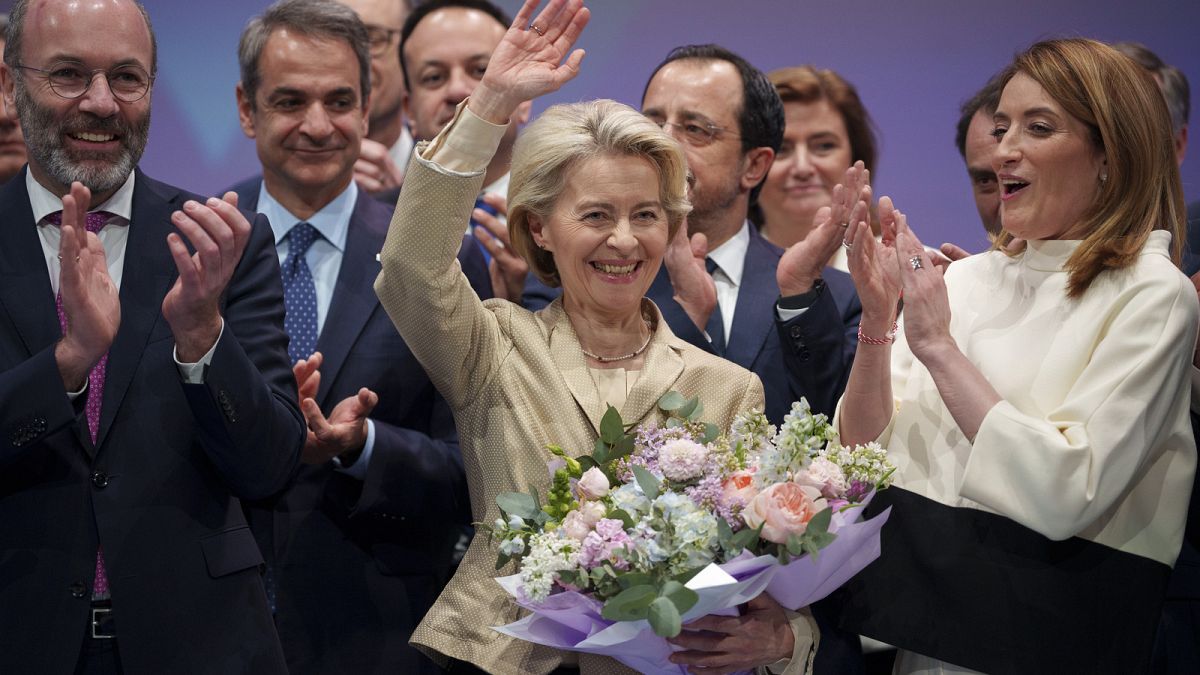Analysis: Europe’s centre-right keeps door ajar to populists amid far-right surge
For years, the centre-right EPP group has drawn a red line on the eurosceptic, far right forces in the European Parliament. That line could shift after June’s European elections. There was confidence in the air as the European People’s Party kicked off its pre-election campaign in Bucharest on Thursday. The group is projected to scoop up […]


For years, the centre-right EPP group has drawn a red line on the eurosceptic, far right forces in the European Parliament. That line could shift after June’s European elections.
There was confidence in the air as the European People’s Party kicked off its pre-election campaign in Bucharest on Thursday. The group is projected to scoop up almost a quarter of the vote to win June’s ballot, and remain the European Parliament’s biggest faction.
But with its vote share stagnating as the far right surges – and with its fellow mainstream parties in demise – questions are mounting over whether the EPP will flirt with populist partners it previously considered off-limits.
Especially as its member parties have already done so in some EU capitals.
Its lead candidate Ursula von der Leyen has vowed to only build bridges with pro-European, pro-NATO and pro-Ukrainian parties after the vote. For decades, the group has formed a ‘grand coalition’ with the centre and centre-left.
But as voters tilt sharply to the right, the EPP is not ruling out new alliances with members of the European Conservatives and Reformists (ECR), giving a foothold to eurosceptic forces in Brussels.
The president of the ECR party, Giorgia Meloni, has rowed back on the anti-EU rhetoric that saw her elected Italy’s Prime Minister in late 2022, and has forged a close relationship with von der Leyen. Speculation is rife that members of her Fratelli d’Italia party in the European Parliament could reach an informal agreement to cooperate with the EPP in the next legislature.
The Czech delegation of the ECR is also considered a moderate partner compatible with the centre-right, several EPP delegates told Euronews.
“Right-wing parties are very different across the EU’s member states. We cannot put Germany’s Alternative for Germany (AfD) in the same basket as, for example, ODS in the Czech Republic, who were previously eurosceptic but are now clearly not,” German MEP Peter Liese told Euronews.
But with the likes of the notorious Finns Party, Spain’s Vox and France’s Reconquête! also belonging to the ECR, opposition groups to the left of the political spectrum are blasting their centre-right counterparts’ willingness to play footsie with hard-right conservatives.
Responding to a question from Euronews, Italian foreign minister and EPP vice-president Antonio Tajani – whose centre-right Forza Italia party is in government with far-right groups – clearly expressed the EPP’s willingness to form new alliances that would replace the grand coalition.
“I hope that we can work with ECR, that we can work with the liberals. We certainly cannot think that there are only socialists in the EU institutions,” Tajani said.
“There are other forces, other realities, among them the conservatives and the liberals, so we will see what the electoral results will be,” he went on. “If the conservatives, as they have recently demonstrated, take the side of Europeanism, take the side of Atlanticism, we are ready to dialogue and discuss (these choices) with them.”
In capitals, far right moves into mainstream
Signs that the far right is marching into Europe’s political mainstream are not new. But whilst these have been proven overblown in previous European elections, in 2024 the threat seems real.
In the Netherlands, Geert Wilders is in coalition talks after a stunning victory in last year’s national elections. Marine Le Pen’s National Rally is comfortably topping the polls in France. A new far-right challenger is upsetting the two-party dominance in Portugal. Alternative for Germany is a comfortable second in German polls, despite factions of the party being deemed extremist by the courts.
Far-right or anti-European parties are predicted to come first in nine member states – including France and Italy – and second in a further nine, in June’s ballot.
Mainstream conservatives in several EU member states have already transgressed the ‘sanitary cordon’ designed to keep fringe groups in check.
EPP member parties are governing in a coalition or with the support of far-right or eurosceptic parties in the Czech Republic, Finland, Italy and Sweden. In a further handful of countries, including Austria, Portugal and Spain, coalition deals between the centre and far right have become commonplace at regional level.
But the EPP says Europe must also be vigilant to both right- and left-wing forces on the fringes.
“Our peaceful and united Europe is being challenged like never before by populists, by nationalists, by demagogues, whether it’s the far-right or the far-left,” von der Leyen told the congress in Bucharest.
But many of the EPP group’s policy priorities, outlined in its electoral manifesto, suggest that the group is embracing hard-right ideologies to prevent an exodus of voters to far-right challengers.
It includes a proposal to outsource asylum applications for those seeking refuge in the EU to so-called “safe” third countries, based on the UK-devised Rwanda model.
Questioned about the legality of the idea, von der Leyen assured reporters: “It is absolutely clear that whatever we do will be in full respect of our obligations under EU and international law,” adding that the concept of safe third countries is already enshrined in EU law.














